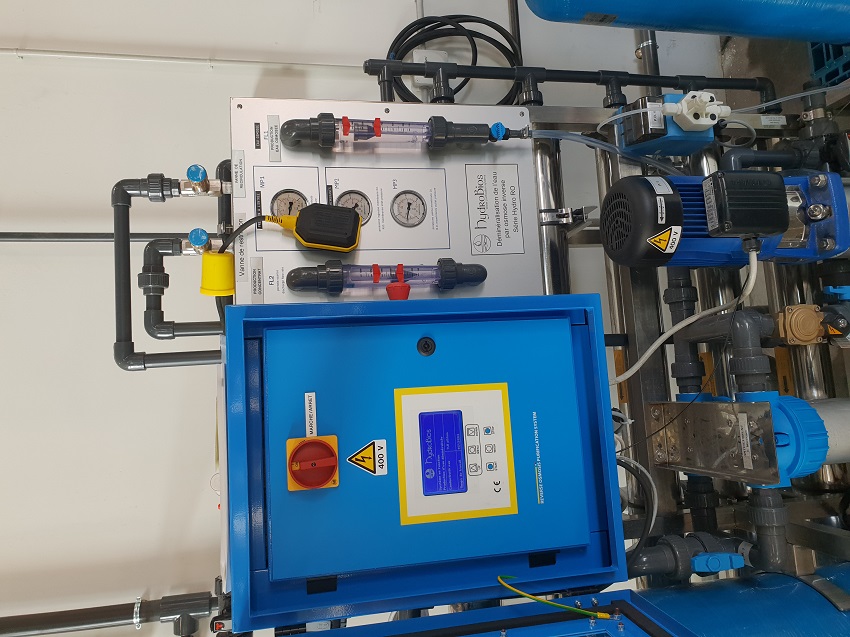What are the differences between osmosis and reverse osmosis?
2 answers
Osmosis is a natural phenomenon. It is a phenomenon that occurs when two liquids containing different concentrations of dissolved solids are separated by a semi-permeable membrane, allowing only the liquids to pass. Thus, the liquid with the smallest proportion of dissolved solids will cross the membrane, to go to the liquid which contains the greatest concentration. The water level should therefore rise on one side, and it is this height differential that is called osmotic pressure.
On the other hand, reverse osmosis is not a natural phenomenon. This is a technique used for water treatment. A pressure stronger than the osmotic pressure is applied, which triggers the opposite phenomenon to osmosis. Liquids pass through the membrane, and dissolved solids remain in their original location.
This solution can be used for the purpose of purifying water, through a reverse osmosis membrane. Water with a high concentration of dissolved salts (brackish) must enter the soft solution, which has a low concentration of dissolved salts. Thanks to a pressure higher than the osmotic pressure, the water is purified, and the brine becomes more concentrated and evacuated.
Although these principles are opposed, it is interesting to understand how they work in order to apply them in different environments, the reverse osmosis technique being a water treatment solution with proven effectiveness and the most successful of all. its broad spectrum of management of the pollutants present in the water.
Osmosis is the phenomenon of diffusion of matter , characterized by the passage of solvent molecules from one solution to another through the semi-permeable membrane which separates these two solutions whose solute concentrations are different; the overall solvent transfer then takes place from the least concentrated solution ( hypotonic medium) to the most concentrated solution ( hypertonic medium) until equilibrium ( isotonic medium). This phenomenon only concerns the exchanges between two liquid solutions which have different concentrations of solutes , separated by a semi-permeable wall.
Questions on the same topic
We are looking for a solution to make the water from the well of our future (old) house drinkable, not connected to the collective drinking water network. Recommendations?
Last response: Hello, It is important to carry out an analysis of your water before taking any action. This will make it possible to determine the physicochemical parameters of the latter and highlight the... Read more
What is the best system for a vegetable shop wishing to recycle its washing water and therefore reuse it in a closed circuit?
Last response: If you are looking for efficiency, go for the Ozone & ZonoSistem
What is the average price of osmosis water?
Last response: The price of reverse osmosis water depends on several factors. First of all, the origin of the raw water to be treated and its production cost. (well, public network drilling, etc. Read more
What industries benefit most from advanced wastewater treatment technologies ?
Last response: Les technologies avancées de traitement des eaux usées sont particulièrement bénéfiques dans plusieurs secteurs industriels. Read more
Does reverse osmosis filter out PFAS?
Last response: La filtration par osmose inverse est un procédé efficace pour éliminer les substances per- et polyfluoroalkylées (PFAS) de l'eau. Read more
What is the difference between osmosis and reverse osmosis?
Last response: Reverse osmosis is a system that purifies water containing materials in solution through a filtering system that only lets water molecules through.
What are the constraints for reusing the concentrate water from a reverse osmosis system?
Last response: Hello, The question of using concentrate after osmosis is interesting, but for what application? Only your answer concerning this use can make it possible to answer it. Cordially Hydrobios.com
What is the cost of a liter of reverse osmosis water?
Last response: Hello, Without knowing where we start from, it is difficult to know the cost of production. the analysis of the raw water and its origin will make it possible to know more about the treatments to be... Read more
What is RE-USE of process water? Is it allowed in every country?
Last response: Hello, RE-USE and RE-UTE (Reuse of Treated Wastewater) are governed by French and European legislation. The recent evolution of European legislation (May 2020) opens the field of possibility for the... Read more
What is the impact of mineral ions on water purification?
Last response: Les ions minéraux jouent un rôle crucial dans les procédés de purification de l'eau, influençant divers aspects technico-chimiques. Read more


